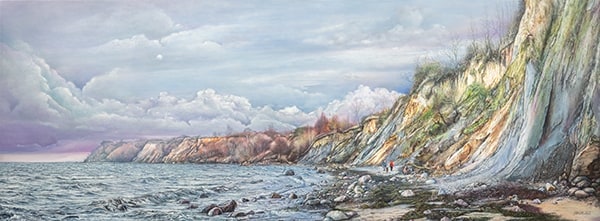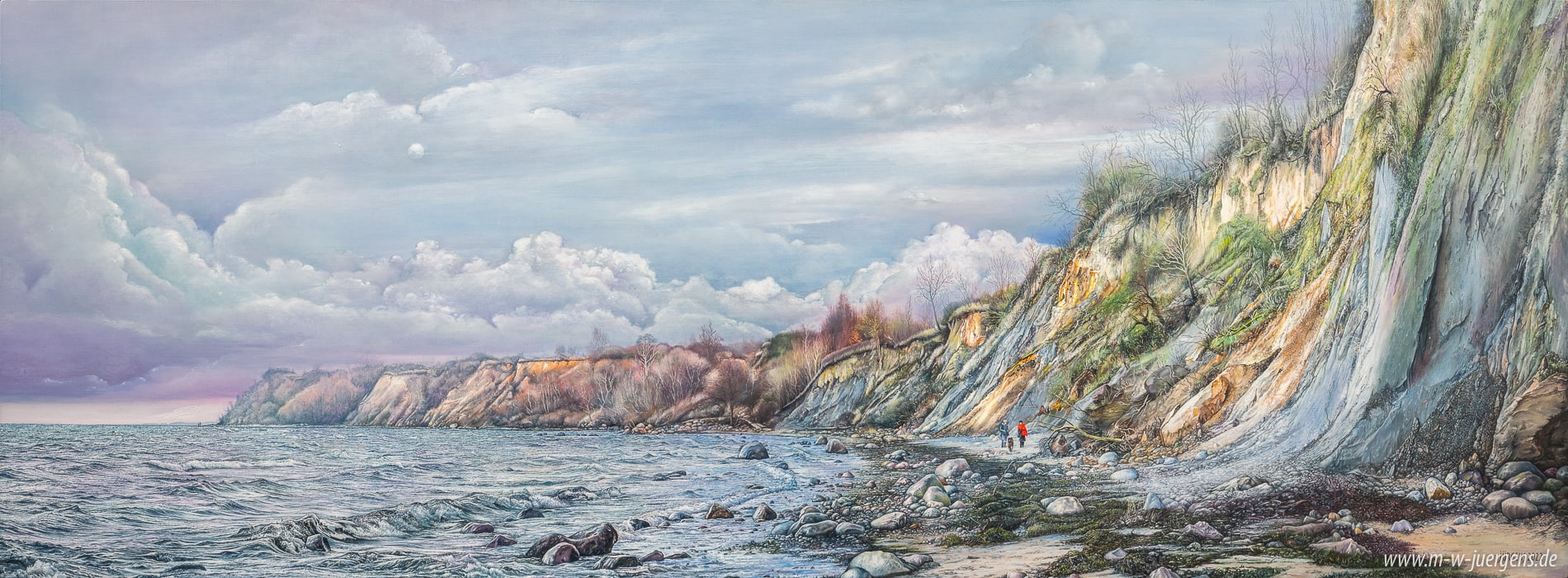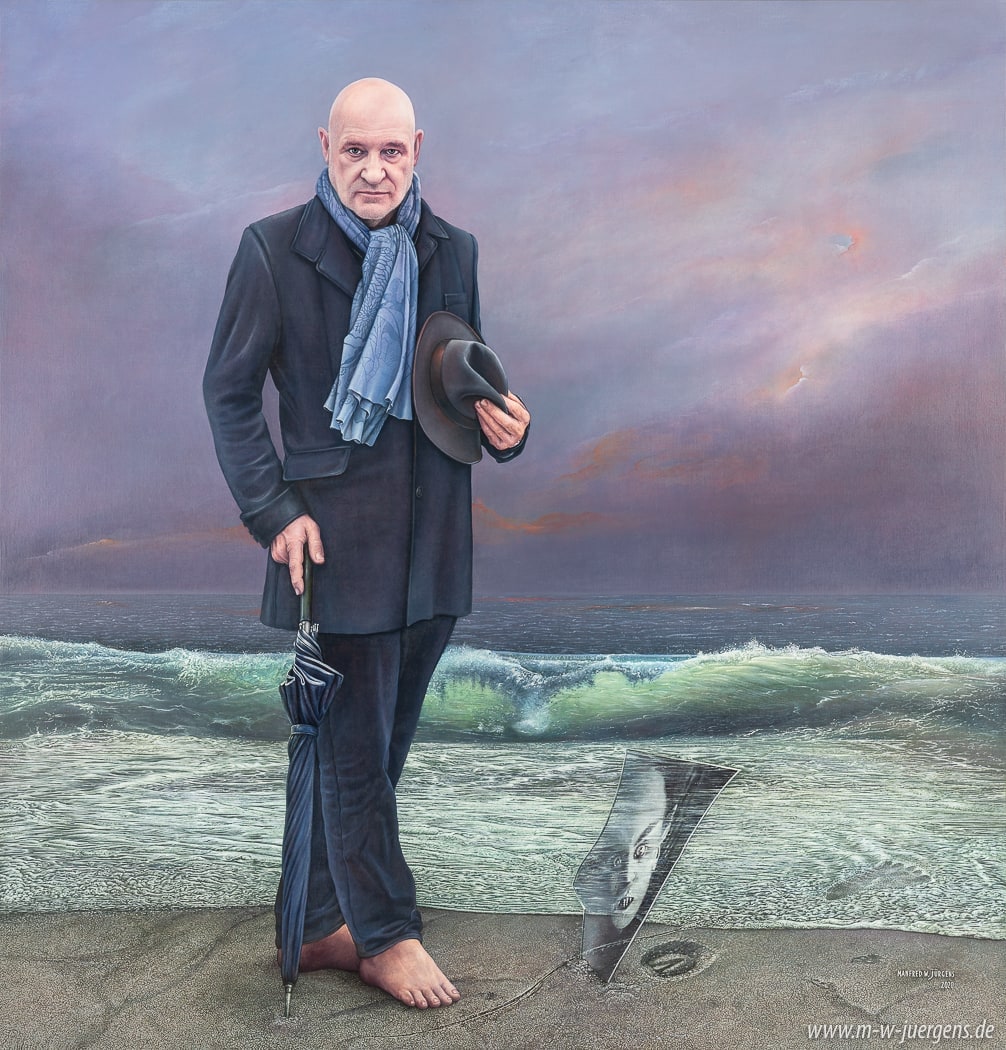

Lonely coastal landscapes invite you to doze off. For me, snoozing is a particularly Nordic way of taking a walk within yourself.
Steep banks, rough winds and surging masses of water make the taciturn northern people shine and, hard to believe, even secretly philosophize.
Even as a child, I liked to sit lonely by the Baltic Sea, albeit far too seldom, and dreamed myself away, far out into the mysterious beyond the horizon.
It is always relaxing and at the same time a stroll through transience. Hikes by the sea are like good music, you often feel quite small and floating happy when enjoying them.
The sound of the sea carries us humans into infinity and tells us 'Time doesn't pass, we pass'. The rock experiences the same on its way to the coast. Stones lie there like sleeping primordial beings, occasionally with mysteriously polished mimes.
The Vistula Ice Age pushed them from Sweden to our coast 12,000 years ago. The sea rubbed many of them to sand and some defiantly remained as erratic boulders. Some call themselves Sweden Stones. How does a Swedish stone feel that has been washed by water for thousands of years? It certainly does not care which beach it sunbathes or swims on. The main thing for it is that there is sand, salty air and laughing seagulls.
Cracked edges reveal ochre-glowing earth pigments in all their beauty. Sand Martins dig nests in steep, sandy ridges. Wind blows grass seed between soon to be falling trees. They look into the abyss at their withered relatives bending over rocks. The ever-hungry sea fetches them with the next storm surge and shapes them into polished, light-colored wooden skeletons. Wounds, scars, inclusions, occasionally an amber. Incessant illegal shipments of sediment between states, such is the sea. It knows no borders.
There's a skull. Since when has the sea been dragging it, or has it just exposed it?
Of course, the Baltic Sea is not an ocean. Anyway, here's a quote from the American poet Sarah Kay: 'Because there's nothing more beautiful than the way the ocean refuses to stop kissing the shoreline, no matter how many times it's sent away.'
In the picture two are walking with a dog. They are my wife and our friend Katharina with a bright red scarf and her dog Peppina.
Coastal hikes are not only suitable for daydreams, but also for melancholic reflections. Icy cold blows around the walkers.
For decades, the sea, its omnipotence, has reminded me of a person it took from us. We called him Cherry. I once went to sea with him as an able seaman apprentice on the motor vessel MS Georg Buechner under Captain Schickedanz.

 Together with our buddy Stoff, we dreamed of sailing on the oil tanker MS Böhlen after the apprenticeship. An eye disease took away my seaman's book at the end of my apprenticeship. Stoff his story also led to leaving the shipping company. How lucky from today's point of view.
Together with our buddy Stoff, we dreamed of sailing on the oil tanker MS Böhlen after the apprenticeship. An eye disease took away my seaman's book at the end of my apprenticeship. Stoff his story also led to leaving the shipping company. How lucky from today's point of view.
October 14, 1976: A navigational error, the tanker leaked and later sank off the French coast of Crozon. I found out about our friend's death through the television news.
On the way to scrapping, our former training vessel MS Georg Buechner later sank off Cape Rozewie on May 30, 2013.
Ocean. It constantly takes, often unforgivably, but it also gives away melancholy, dream worlds, primeval things, relaxation and wanderlust. Of course, there is also danger in every coastal and sea magic. Maybe that's why the beauty of the ailing fishes its charm from it. There is a strange, never-ending fascination in the view of the incessantly churning infinity of the sea.
For five years now I have been living again at the southernmost point of the Baltic Sea, in Wismar. Certainly, this sea will often provoke me to new pictures.
❯ Christian Redl would say: 'Melancholy is a condition that is too highly desirable'.
would say: 'Melancholy is a condition that is too highly desirable'.
Text © MWJ, Wismar, July 14, 2022
Image above: Painting by MWJ · Cliffs Kluetzer Winkel · 2022, Oil on Canvas on Panel, 74 x 200 cm
Image below: MS Georg Büchner · Cardboard model 1 : 250 · © Rolf Hilbert | Stoffs Kellerwerft · Wismar 2023